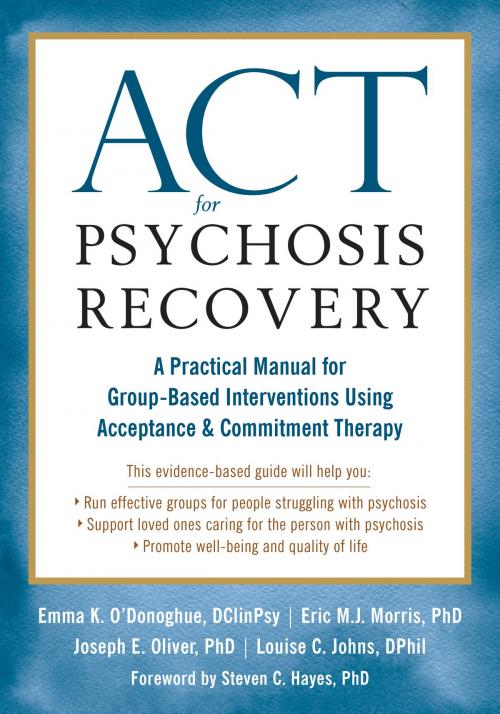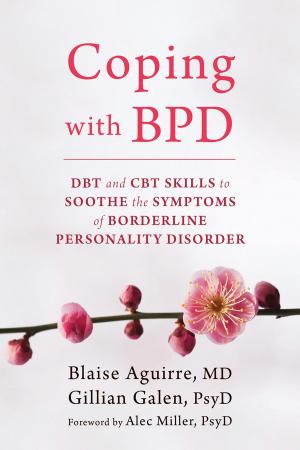ACT for Psychosis Recovery
A Practical Manual for Group-Based Interventions Using Acceptance and Commitment Therapy
Nonfiction, Health & Well Being, Psychology, Mental Illness, Clinical Psychology, Cognitive Psychology| Author: | Emma K. O'Donoghue, DClinPsy, Eric M.J. Morris, PhD, Louise C. Johns, DPhil, Joe Oliver, PhD | ISBN: | 9781626256156 |
| Publisher: | New Harbinger Publications | Publication: | March 1, 2018 |
| Imprint: | Context Press | Language: | English |
| Author: | Emma K. O'Donoghue, DClinPsy, Eric M.J. Morris, PhD, Louise C. Johns, DPhil, Joe Oliver, PhD |
| ISBN: | 9781626256156 |
| Publisher: | New Harbinger Publications |
| Publication: | March 1, 2018 |
| Imprint: | Context Press |
| Language: | English |
ACT for Psychosis Recovery is the first book to provide a breakthrough, evidence-based, step-by-step approach for group work with clients suffering from psychosis. As evidenced in a study by Patricia A. Bach and Steven C. Hayes, patients with psychotic symptoms who received acceptance and commitment therapy (ACT) in addition to treatment as usual showed half the rate of rehospitalization as those who did not. With this important guide, you’ll learn how a patient’s recovery can be both supported and sustained by promoting acceptance, mindfulness, and values-driven action.
The journey of personal recovery from psychosis is immensely challenging. Patients often struggle with paranoia, auditory hallucinations, difficulties with motivation, poor concentration and memory, and emotional dysregulation. In addition, families and loved ones may have trouble understanding psychosis, and stigmatizing attitudes can limit opportunity and create alienation for patients.
True recovery from psychosis means empowering patients to take charge of their lives. Rather than focusing on pathology, ACT teaches patients how to stay grounded in the present moment, disengage from their symptoms, and pursue personally meaningful lives based on their values.
In this groundbreaking book, you will learn how to facilitate ACT groups based on a central metaphor (Passengers on the Bus), so that mindfulness and values-based action are introduced in a way that is engaging and memorable. You will also find tips and strategies to help clients identify valued directions, teach clients how to respond flexibly to psychotic symptoms, thoughts, and emotions that have been barriers to living a valued life, and lead workshops that promote compassion and connection among participants.
You’ll also find tried and tested techniques for engaging people in groups, particularly those traditionally seen as “hard to reach”—people who may be wary of mental health services or experience paranoia. And finally, you’ll gain skills for engaging participants from various ethnic backgrounds.
Finding purpose and identity beyond mental illness is an important step in a patient’s journey toward recovery. Using the breakthrough approach in this book, you can help clients gain the insight needed to achieve lasting well-being.
ACT for Psychosis Recovery is the first book to provide a breakthrough, evidence-based, step-by-step approach for group work with clients suffering from psychosis. As evidenced in a study by Patricia A. Bach and Steven C. Hayes, patients with psychotic symptoms who received acceptance and commitment therapy (ACT) in addition to treatment as usual showed half the rate of rehospitalization as those who did not. With this important guide, you’ll learn how a patient’s recovery can be both supported and sustained by promoting acceptance, mindfulness, and values-driven action.
The journey of personal recovery from psychosis is immensely challenging. Patients often struggle with paranoia, auditory hallucinations, difficulties with motivation, poor concentration and memory, and emotional dysregulation. In addition, families and loved ones may have trouble understanding psychosis, and stigmatizing attitudes can limit opportunity and create alienation for patients.
True recovery from psychosis means empowering patients to take charge of their lives. Rather than focusing on pathology, ACT teaches patients how to stay grounded in the present moment, disengage from their symptoms, and pursue personally meaningful lives based on their values.
In this groundbreaking book, you will learn how to facilitate ACT groups based on a central metaphor (Passengers on the Bus), so that mindfulness and values-based action are introduced in a way that is engaging and memorable. You will also find tips and strategies to help clients identify valued directions, teach clients how to respond flexibly to psychotic symptoms, thoughts, and emotions that have been barriers to living a valued life, and lead workshops that promote compassion and connection among participants.
You’ll also find tried and tested techniques for engaging people in groups, particularly those traditionally seen as “hard to reach”—people who may be wary of mental health services or experience paranoia. And finally, you’ll gain skills for engaging participants from various ethnic backgrounds.
Finding purpose and identity beyond mental illness is an important step in a patient’s journey toward recovery. Using the breakthrough approach in this book, you can help clients gain the insight needed to achieve lasting well-being.















